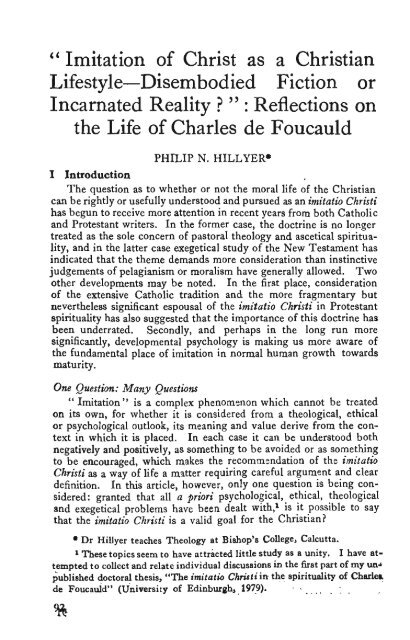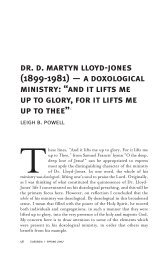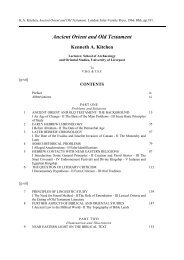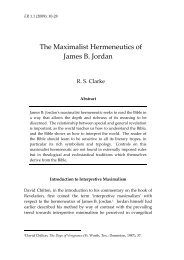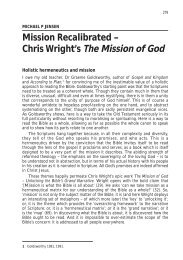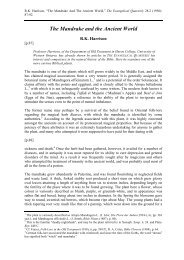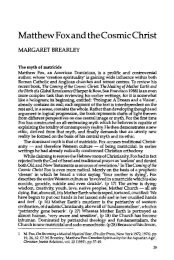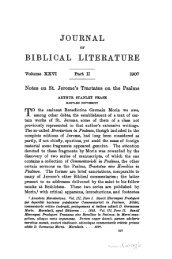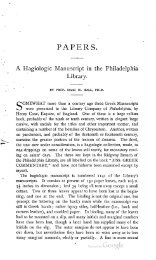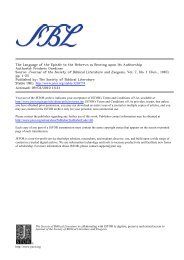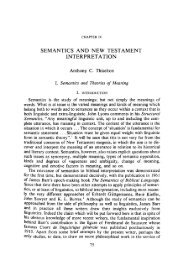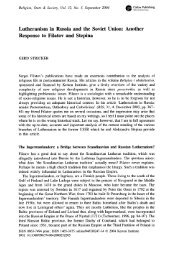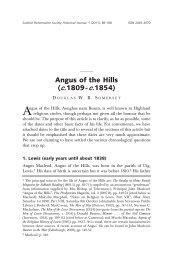'' Imitation of Christ as a Christian Lifestyle-Disembodied Fiction or ...
'' Imitation of Christ as a Christian Lifestyle-Disembodied Fiction or ...
'' Imitation of Christ as a Christian Lifestyle-Disembodied Fiction or ...
You also want an ePaper? Increase the reach of your titles
YUMPU automatically turns print PDFs into web optimized ePapers that Google loves.
<strong>''</strong> <strong>Imitation</strong> <strong>of</strong> <strong>Christ</strong> <strong>as</strong> a <strong>Christ</strong>ian<br />
<strong>Lifestyle</strong>-<strong>Disembodied</strong> <strong>Fiction</strong> <strong>or</strong><br />
Incarnated Reality ? <strong>''</strong> : Reflections on<br />
the Life <strong>of</strong> Charles de Foucauld<br />
PHILIP N. HILL YER•<br />
I Introduction<br />
The question <strong>as</strong> to whether <strong>or</strong> not the m<strong>or</strong>al life <strong>of</strong> the <strong>Christ</strong>ian<br />
can be rightly <strong>or</strong> usefully understood and pursued <strong>as</strong> an imitatio <strong>Christ</strong>i<br />
h<strong>as</strong> begun to receive m<strong>or</strong>e attention in recent years from both Catholic<br />
and Protestant writers. In the f<strong>or</strong>mer c<strong>as</strong>e, the doctrine is no longer<br />
treated <strong>as</strong> the sole concern <strong>of</strong> p<strong>as</strong>t<strong>or</strong>al theology and <strong>as</strong>cetical spirituality,<br />
and in the latter c<strong>as</strong>e exegetical study <strong>of</strong> the New Testament h<strong>as</strong><br />
indicated that the theme demands m<strong>or</strong>e consideration than instinctive<br />
judgements <strong>of</strong> pelagianism <strong>or</strong> m<strong>or</strong>alism have generally allowed. Two<br />
other developments may be noted. In the first place, consideration<br />
<strong>of</strong> the extensive Catholic tradition and the m<strong>or</strong>e fragmentary but<br />
nevertheless significant espousal <strong>of</strong> the imitatio <strong>Christ</strong>i in Protestant<br />
spirituality h<strong>as</strong> also suggested that the imp<strong>or</strong>tance <strong>of</strong> this doctrine h<strong>as</strong><br />
been underrated. Secondly, and perhaps in the long run m<strong>or</strong>e<br />
significantly, developmental psychology is making us m<strong>or</strong>e aware <strong>of</strong><br />
the fundamental place <strong>of</strong> imitation in n<strong>or</strong>mal human growth towards<br />
maturity.<br />
One Question: Many Questions<br />
" <strong>Imitation</strong>" is a complex phenomenon which cannot be treated<br />
on its own, f<strong>or</strong> whether it is considered from a theological, ethical<br />
<strong>or</strong> psychological outlook, its meaning and value derive from the context<br />
in which it is placed. In each c<strong>as</strong>e it can be understood both<br />
negatively and positively, <strong>as</strong> something to be avoided <strong>or</strong> <strong>as</strong> something<br />
to be encouraged, which makes the recommendation <strong>of</strong> the imitatio<br />
<strong>Christ</strong>i <strong>as</strong> a way <strong>of</strong> life a m1tter requiring careful argument and clear<br />
definition. In this article, however, only one question is being considered:<br />
granted that all a pri<strong>or</strong>i psycholo~ical, . et.hical, ~heological<br />
and exegetical problems have been dealt wtth, 1 1s ~t .posstble to say<br />
that the imitatio <strong>Christ</strong>i is a valid goal f<strong>or</strong> the Chnsttan?<br />
• Dr Hillyer teaches Theology at Bishop's College, Calcutta.<br />
1 These topics seem to have attracted little study <strong>as</strong> a unity. I have attempted<br />
to collect and relate individual discussions in the first part <strong>of</strong> my un"<br />
published doct<strong>or</strong>al thesis, "The imitatw <strong>Christ</strong>i in the. spirituality <strong>of</strong> Charlea.<br />
de Foucauid" (University <strong>of</strong> Edinburgh,.~ f(79). . .. , , .
YetalthoQgh we have r~duced the field <strong>of</strong> enquiry to o:1.e q'Iestion,<br />
it will be immediately apparent that to COm~ to a ·satisfact<strong>or</strong>y an1W!r<br />
to it, several other questions m•1st b:! <strong>as</strong>ked and answered. C.1n W!<br />
have a clear understanding <strong>of</strong> this aim to imitate CCtrist, <strong>or</strong> dJ W! fi.J.i<br />
ourselves coming to one <strong>or</strong> oth"!r <strong>of</strong> th:! follo ·.ving c:>n.dusio:-ts? D >!s<br />
dose examination <strong>of</strong> our in.terpretation <strong>of</strong> his life cJnvince us tln.t<br />
our understanding is so overlaid with traditio"ls a::.::·Irtnlated within<br />
the Church's life and even in. our ow.:t, that we fe~l th 1t a tn.l:! picture<br />
is unobtainable? Or do we say th1t such a pictLire, enn if obtain1ble<br />
(can fact evgr be sepuated fro:n interpretatio1?), wnld b:: a u>;:.leH<br />
and a dangerous abstraction fro:n b:>th th~ th~:>losical ani p3V.::hJlogical<br />
point <strong>of</strong> view? In other ward,, is o·n in.terpretatioJ. <strong>of</strong> th"!<br />
life <strong>of</strong> <strong>Christ</strong> so particular and culture and tim ~-bnnd that if it is Mt<br />
hopelessly dist<strong>or</strong>ted, it is still irrelevant f<strong>or</strong> to:lay? Or is our untlerstanding<br />
so general that there is not m 1::h m ue s'!t b ;:.f<strong>or</strong>e u> f<strong>or</strong> imitation<br />
than an inspirin~ idea? But could th;:.re b:: a third pJ3'!ibility?<br />
Is it possible to avoid the dis:!m,:>:iied fictio:1 and draw on. ail in<br />
(:arnated reality in such a way <strong>as</strong> to m1kt: this real in oJ.r O'N .1 tin! art i<br />
situation?<br />
Such questions m•1st be faced int o1.ly by iniivid·nls, b·1t ak> by<br />
-communities which un.derstand their life a3 an imitatio c;Lristi. In<br />
India, this is especially true <strong>of</strong> Cluistian a~hran~. bJth <strong>of</strong> puticu\ar<br />
foundations which have made explicit <strong>or</strong> irn!)licit avowal <strong>of</strong> this g_:n\,<br />
and <strong>of</strong> the <strong>as</strong>hram mwern;:.nt in general which hl'> fron tin'! to tun-:<br />
end<strong>or</strong>sed this description <strong>of</strong> its life.<br />
Would, f<strong>or</strong> example, the sh:>rt-lived "Broth'!rhni <strong>of</strong> th ~ I:nit1tio1.<br />
compare with the guru tradition in Hinduism and Sikhism, <strong>or</strong> with.<br />
the imitation <strong>of</strong> Muhammed in Islam?•<br />
·One way to answer these questions would be to make an exhaustive<br />
~tudy <strong>of</strong> the hist<strong>or</strong>y <strong>of</strong> an <strong>as</strong>hram and trace the relationship between<br />
Its Rule and its day to day life, another is to turn from India to Africa,<br />
to turn from an actual community to the would-be founder <strong>of</strong> a community.<br />
F<strong>or</strong>, strange <strong>as</strong> it may seem, the most rig<strong>or</strong>ous and illuminating<br />
application <strong>of</strong> the principle <strong>of</strong> imitatio <strong>Christ</strong>i in modern times is<br />
to be found in Charles de Foucauld, who w<strong>as</strong> not to see any followers<br />
in his life-time. But in the development <strong>of</strong> his Rule in the light <strong>of</strong><br />
his own. experience, we can see, if not its full significance in the life<br />
<strong>of</strong> a community, at le<strong>as</strong>t indications <strong>of</strong> how the imitatio <strong>Christ</strong>i can<br />
take its place amongst other guides to action.<br />
From t!Je General to the Particular: Yet M<strong>or</strong>e Questions<br />
Charles de Foucauld is a complex and enigmatic figure who h<strong>as</strong>.<br />
defeated the eff<strong>or</strong>ts <strong>of</strong> most <strong>of</strong> his biographers to comprehend the<br />
many facets <strong>of</strong> his life and w<strong>or</strong>k.ll There is abundant material to<br />
chart the development <strong>of</strong> his "inner life" <strong>of</strong> devotion to <strong>Christ</strong> and his<br />
changi.Qg understanding <strong>of</strong> the personal and c<strong>or</strong>p<strong>or</strong>ate dimensions <strong>of</strong><br />
the imitatio <strong>Christ</strong>i. There is also plenty <strong>of</strong> evidence from which to<br />
reconstruct the hist<strong>or</strong>ical and cultural fact<strong>or</strong>s influencing his "outer<br />
life." StreSs on one <strong>as</strong>pect leads to pictures <strong>of</strong> a <strong>Christ</strong>ian mystic<br />
and hermit unconcerned with. external· affairs,. whilst stress on the<br />
other presents him <strong>as</strong> a very effective (although un<strong>of</strong>ficial) agent <strong>of</strong><br />
French colonialism, whose "religious ph<strong>as</strong>e" did not really separate<br />
him from his own and his family's military tradition.<br />
So one interpretation would S{em to allow us to conclude that the<br />
1"mitatio <strong>Christ</strong>i w<strong>as</strong> the mainspring <strong>of</strong> his life, although it would also<br />
'Tayl<strong>or</strong>, Zoe. cit., pp. 25-27, C.O. McMullen (ed.), The Nature <strong>of</strong><br />
Guruship (Delhi: ISFCK, 19:6); J. E. Roystu, "Muhammad <strong>as</strong> teacher and<br />
exemplar," Muslim W<strong>or</strong>ld, LXVIII, No. 4 (1978), pp. 235-58.<br />
1 Exceptions to this are the first, and in many ways still the best,.<br />
biography: R. Bazin, Charles de Foucauld, explcrateur du Maroc, ermite du<br />
Sahara (Paris: Pion, 1921, ET London: Burns, Oates and W<strong>as</strong>hbourne,<br />
19312), v.:hich did not raile the rrobl
aise questions about the validity <strong>of</strong> such a life apparently ·oblivious<br />
<strong>of</strong> events in the outside w<strong>or</strong>ld. Would this approach not involve<br />
dealing with theologically and psychologically dangerous ·abstractions?<br />
The other view would have us believe that De Foucauld's devotional<br />
life had no significant bearing on his behaviour, and that actions<br />
he interpreted <strong>as</strong> a following <strong>or</strong> imitation <strong>of</strong> <strong>Christ</strong> were no m<strong>or</strong>e than<br />
a result <strong>of</strong> interplay between heredity and environment. On this<br />
interpretation, "Once a soldier, always a soldier" would be an apt<br />
summary <strong>of</strong> his life, whilst his own outlook, "Once a monk, always a<br />
monk," should be discounted.<br />
Who then w<strong>as</strong> De Foucauld? W<strong>as</strong> he one <strong>or</strong> the other? W<strong>as</strong><br />
he sometimes one, and sometimes the other? 'vVere these different<br />
<strong>as</strong>pects <strong>of</strong> his personality kept separate <strong>or</strong> were they integrated?<br />
Examination <strong>of</strong> the two interpretations outlined above shows that<br />
they simplify matters through only considering part <strong>of</strong> the evidence.<br />
When all the material is put together a chronological development<br />
can be traced in De Foucauld's understanding <strong>of</strong> the imitatio <strong>Christ</strong>i<br />
and <strong>of</strong> himself which fits into his response to external events. On<br />
one hand, there w<strong>as</strong> a gradual simplification <strong>of</strong> his concept <strong>of</strong> the imitatio<br />
<strong>Christ</strong>i from very naive an'd complex beginnings; whilst on the<br />
other there w<strong>as</strong> a growing awareness that clues to .the application oi<br />
its central element-loving obedience to the Father-were to be found<br />
in the concrete realities <strong>of</strong> De Foucauld's own situation. The question<br />
to <strong>as</strong>k w<strong>as</strong> "What would Jesus do now?" and De Foucauld w<strong>as</strong> to<br />
respond with all that he w<strong>as</strong>,· to things <strong>as</strong> they -rWere.<br />
The imp<strong>or</strong>tant fact<strong>or</strong> that is overlooked in exclusively "religious"<br />
<strong>or</strong> "secular" interpretations <strong>of</strong> his life is that the two processes just<br />
mentioned were complementary. I F<strong>or</strong> in :responding "with all that<br />
he w<strong>as</strong>," De Foucauld w<strong>as</strong> respondirrg not only with what he w<strong>as</strong> by<br />
birth and upbringing and ,expeDience up to his conversion at age 28,<br />
but also with what he subsequently.becamethrough the long years <strong>of</strong><br />
following his conception <strong>of</strong> the miitatio <strong>Christ</strong>i. It is true that the<br />
drawing together <strong>of</strong> the two elements'w<strong>as</strong> a long, difficult and faltering<br />
spiritual pilgrimage f<strong>or</strong> De Foucaulcf which ·one would not hold out<br />
f<strong>or</strong> detailed emulation, but their ultimate recdnciliation is an <strong>as</strong>surance<br />
that the b<strong>as</strong>ic imitatio <strong>Christ</strong>i <strong>or</strong>ientation can lead, <strong>as</strong> tho New Testament<br />
and <strong>Christ</strong>ian spirituality have always affirmed, .to a balanced<br />
and mature <strong>Christ</strong>ian life.<br />
( - .<br />
II The C<strong>as</strong>e <strong>of</strong> Charles de l'oucauld<br />
Life<br />
Charles Eugene de Foucauld w<strong>as</strong> hom 15 September 1858 at<br />
Str<strong>as</strong>bourg, the great-great-grand nephew <strong>of</strong> the Archbishop <strong>of</strong> Aries<br />
who w<strong>as</strong> martyred along with his cousin and vicar-general, the blessed<br />
Armand de Foucauld de Pontbriand during the French Revolution.<br />
Whether <strong>or</strong> not tales <strong>of</strong> this great-great-grand uncle inspired Charles<br />
with his later longing f<strong>or</strong> martyrdom, there w<strong>as</strong> no e<strong>as</strong>y <strong>or</strong> dirett link<br />
91
etween the two, f<strong>or</strong> Charles w<strong>as</strong> m<strong>or</strong>e in tune with the military<br />
traditions <strong>of</strong> his family, and turned in· that direction f<strong>or</strong> a ca.reer after<br />
a disturbed and unhappy childhood which alienated hi:n from the<br />
<strong>Christ</strong>ian faith.<br />
The loss <strong>of</strong> both parents bef<strong>or</strong>e he w<strong>as</strong> six years old could not be<br />
compensated f<strong>or</strong> by the kindly but som'!what over-indulgent care <strong>of</strong><br />
his 70 year old grandfather, and the marriage <strong>of</strong> his cousin M :uie in<br />
1874 removed from Charles, at le<strong>as</strong>t f<strong>or</strong> a tim~. his only real source<br />
<strong>of</strong> human understanding, love and security. The 16 year old boy<br />
lost his faith soon afterwards and w<strong>as</strong> unable to settle down to either<br />
the atmosphere <strong>or</strong> the discipline <strong>of</strong> the Jesuit school in Paris at which<br />
he w<strong>as</strong> preparing f<strong>or</strong> the StCyr Military College entrance exa:nination.<br />
He had to finish his studies with a private tllt<strong>or</strong>, and after a pro;nising<br />
first year at St Cyr the old ennui returned. The death <strong>of</strong> his grandfather<br />
combined with Charles' coming into his family inheritance to<br />
make him even m')re m')rally and financially free to do just <strong>as</strong> he liked.<br />
His behaviour at the cavalry school at Saumur deteri<strong>or</strong>ated even<br />
further, and he w<strong>as</strong> f<strong>or</strong>tunate to graduate bottom <strong>of</strong> the 'list.<br />
The military auth<strong>or</strong>ities were tolerant <strong>of</strong> most <strong>of</strong> his escapades<br />
but drew the line at being publicly humiliated by Charles p<strong>as</strong>sing<br />
<strong>of</strong>f his mistress <strong>as</strong> the Vicomtesse de Foucauld during the regiment's<br />
voyage to N<strong>or</strong>th Africa. F<strong>or</strong>ced to resign from the active list, but<br />
finding life with her no solution to his chronic melancholia, Charles<br />
applied f<strong>or</strong> reinstatement in his regiment <strong>as</strong> soon <strong>as</strong> he heard it w<strong>as</strong><br />
going into action. During eight months' hard fighting quelling a<br />
native uprising, he distinguished himself <strong>as</strong> a kind and brave <strong>of</strong>ficer,<br />
and acquired a sense <strong>of</strong> responsibility and purpose f<strong>or</strong> the first time<br />
in his life.<br />
If this experience w<strong>as</strong> De Foucauld's m<strong>or</strong>al conversion, it w<strong>as</strong> also<br />
the beginning <strong>of</strong> a religious one prompted by his observations <strong>of</strong> the<br />
very visible place <strong>of</strong> religion in the Muslim Arabs' practice <strong>of</strong> daily<br />
prayers. He decided to try to find out m<strong>or</strong>e about them, but <strong>as</strong> the<br />
army would not sanction an expedition, he resigned his commission<br />
and went ahead on his own. The material De Foucauld collected<br />
during his wanderings through M<strong>or</strong>occo between June 1883 and May<br />
1884 earned him the gold medal <strong>of</strong> the Paris Societe de Ge)graphie<br />
in 1885, but by the time his Reconnaisance au Maroc w<strong>as</strong> published in<br />
February 1888, he w<strong>as</strong> far m<strong>or</strong>e concerned with spiritual expl<strong>or</strong>ation<br />
.than geographical.<br />
While writing up his notes in Paris, D
De Foucauld must have felt that day that ·all his wanderings and<br />
searchings were now over, but in fact they had only just begun. F<strong>or</strong><br />
if it had taken him 28 years to discover that <strong>as</strong> a man he w<strong>as</strong> a child <strong>of</strong><br />
God, it w<strong>as</strong> going to take nearly <strong>as</strong> long again to find out what kind <strong>of</strong><br />
man that child should become, and to see that there could be continuity<br />
between the first man and the second. To realise that the<br />
latter w<strong>as</strong> not necessarily a judgement <strong>of</strong> the f<strong>or</strong>mer, but could be a<br />
fulfilment <strong>of</strong> it. There w<strong>as</strong> a long spiritual pilgrimage ahead which<br />
can be divided into five periods <strong>of</strong> experience and questioning. Should<br />
he follow his vocation <strong>as</strong> a monk rather than a layman (1886-90), <strong>as</strong> a<br />
Trappist (1890-97), <strong>as</strong> a hermit in the Holy Land (1897-1900), <strong>as</strong> a<br />
priest in an Algerian garrison OI\jthe edge <strong>of</strong> the Sahara d€sert (1901-<br />
05), <strong>or</strong>, finally, <strong>as</strong> the "little,br9,ther" <strong>of</strong> the indigenous nomads at<br />
its centre (1905-16)? r: )d ·<br />
o· ·· · · r<br />
Vocation<br />
Diverse <strong>as</strong> these roles were, ~nd the diversity is signified. by the<br />
variety <strong>of</strong> signatures D~ Fqucauld used dyer the years-the Viscount<br />
became the Trappist brother "frere·Marie-Alberic," then successively<br />
"frere Charles," "fr~re
De Foucauld's unsettled childhood and years <strong>of</strong> m<strong>or</strong>al and religious<br />
drifting made this universal desire f<strong>or</strong> security and the resulting tensions<br />
acute f<strong>or</strong> him. This is shown in several <strong>as</strong>pects <strong>of</strong> his life: the<br />
initial wish to imitate <strong>Christ</strong>, the definition <strong>of</strong> this imitation in a Rule<br />
(both <strong>as</strong> a general programme and in detailed rules), and, in particular,<br />
in De Foucauld's insistence within that Rule <strong>or</strong>i the fundamental<br />
place <strong>of</strong> the rule <strong>of</strong> enclosure.<br />
Issues f<strong>or</strong> Discussion<br />
All these matters raise disturbing questions. In what sense did<br />
Jesus follow a Rule <strong>of</strong> Life? How can any f<strong>or</strong>m <strong>of</strong> the religious life,<br />
whether Benedictine in <strong>or</strong>igin (which De Foucauld followed <strong>as</strong> a<br />
Trappist), <strong>or</strong> b<strong>as</strong>ed on the Seventeenth Century French tradition <strong>of</strong><br />
the "hidden life" <strong>of</strong> Jesus at Nazareth (the idea behind De Foucauld's<br />
Rules f<strong>or</strong> the Little Brothers), be an imitatio <strong>Christ</strong>i? Imp<strong>or</strong>tant <strong>as</strong><br />
these questions are, space requires that we confine ourselves to a third<br />
one which sums up and reinf<strong>or</strong>ces the others. As the principle <strong>of</strong><br />
enclosure would seem to be the one above all that leads away from a<br />
realist'ic imitation-can we even imagine Jesus <strong>as</strong> a contemplative monk<br />
shut away from the w<strong>or</strong>ld?-our discussion <strong>of</strong> De Foucauld's concept<br />
<strong>of</strong> the imitatio <strong>Christ</strong>i will be focussed on that. This is not just a<br />
matter <strong>of</strong> biographical interest, significant though it is in De Foucauld's<br />
c<strong>as</strong>e, f<strong>or</strong> it touches on a point <strong>of</strong> general concern.<br />
The Fundamental Problem<br />
In dealing with the question <strong>of</strong> enclosure we are dealing with a<br />
particular example <strong>of</strong> the following problem. How does an understanding<br />
<strong>of</strong> the imitatio <strong>Christ</strong>i b<strong>as</strong>ed on a subjective bi<strong>as</strong> springing<br />
from a very strong personality trait-either <strong>of</strong> strength <strong>or</strong> weaknessand<br />
apparently legitimised by a strand <strong>of</strong> <strong>Christ</strong>ian tradition, if not<br />
by biblical warrant, become a m<strong>or</strong>e faithful and wholesome imitatio<br />
<strong>Christ</strong>i?<br />
That is to say, how does one reach two things, a "wholesome"<br />
understanding <strong>of</strong> <strong>Christ</strong> which gr<strong>as</strong>ps the central meaning <strong>of</strong> his life,<br />
and is not b<strong>as</strong>ed on a peripheral <strong>or</strong> particular <strong>as</strong>pect taken out <strong>of</strong> context;<br />
and a "whole" <strong>Christ</strong> who is m<strong>or</strong>e than a reflection <strong>of</strong> the wouldbe<br />
imitat<strong>or</strong>'s personality? F<strong>or</strong> while imitation may well begin with<br />
a recognition <strong>of</strong> similarities-total dissimilarity would prevent any<br />
connections being made-without recognition <strong>of</strong> differences there<br />
can be no challenge to growth, no c<strong>or</strong>rection <strong>of</strong> unbalanced development,<br />
and no movement towards greater maturity.<br />
DI Presuppositions and Progress: De Foucauld and<br />
Enclosure<br />
The Nazareth Ideal<br />
The connection between De Foucauld's developing understanding<br />
<strong>of</strong> <strong>Christ</strong> and his concept <strong>of</strong> enclosure is an indkect one, which came<br />
98
through his seei!l~ the imita(io Chris# ~san imitation b£ the. hidden<br />
life o~ Jesu~ at Nazareth. The evdlutionrOf De ·Foucauld's thought<br />
on. thts subject w<strong>as</strong> equally comp~ex and lengthy, but. the essential<br />
pOintS are aS fo,U~WS: he ?egan With the <strong>as</strong>sumption that the three<br />
st~g~s <strong>of</strong> Jesus l~f~ (the htdden Y.ea~s, the temptations and the public<br />
mmts~ry) ha~ legttm~~ted thre~, d~stlnct and mutu~lly ~xclusive types<br />
<strong>of</strong> rehgtous life (the Nazareth life <strong>of</strong> contemplation m cont ct with<br />
one's immediate neighbours, the strictly contemplative life <strong>of</strong> the<br />
desert, and the life <strong>of</strong> priests and apostles, respectively), and that<br />
God had called him to the first <strong>of</strong> these.<br />
Later on, he realised two thing.>. The first w<strong>as</strong> that these three<br />
lives did have certain things in common, such <strong>as</strong> poverty, ch<strong>as</strong>tity,<br />
obedience, contemplation, and practice <strong>of</strong> the inward virtues, chief <strong>of</strong><br />
which were spiritual poverty and humility, and that just <strong>as</strong> Jesus<br />
moved from one to the other, so God might call De Foucauld to do<br />
the same. The second thing he realised w<strong>as</strong> that in any c<strong>as</strong>e, Jesus'<br />
life w<strong>as</strong> a unity maintained by his unwavering will to love, to serve<br />
and to save. This motivation w<strong>as</strong> m<strong>or</strong>e imp<strong>or</strong>tant than the outward<br />
f<strong>or</strong>m <strong>of</strong> his life, and none <strong>of</strong> its three stages made any sense unless<br />
-seen in terms <strong>of</strong> redemption and the cross. Consequently, whilst<br />
De Foucauld felt he w<strong>as</strong> called to imitate the outward <strong>as</strong>pects -<strong>of</strong><br />
Jesus' life <strong>as</strong> well <strong>as</strong> the inner, he came to see that the -latter haCi<br />
pri<strong>or</strong>ity, and the whole w<strong>as</strong> to be seen in a context <strong>of</strong> love and concern<br />
f<strong>or</strong> the salvation <strong>of</strong> man.<br />
•<br />
Thus the "Nazareth" life did not have to be lived either in Nazareth<br />
{<strong>as</strong> De Foucauld believed while he w<strong>as</strong> in the Holy Land, 1897-1900),<br />
<strong>or</strong> <strong>as</strong> a contemplative life apart from men (<strong>as</strong> he believed until much<br />
later on, up to 1904, near the end <strong>of</strong> the first stage ,<strong>of</strong> his life in the<br />
Sahara). So, whilst the "Nazareth" ideal always ~nshrined two<br />
<strong>as</strong>pects <strong>of</strong> De Foucauld's life, contemplation and eucharistic devotion<br />
(ad<strong>or</strong>ation <strong>of</strong> the blessed sacrament being seen <strong>as</strong> analogous to w<strong>or</strong>shipping<br />
with the Holy Family), it did not remain a permanent justi-<br />
1ication <strong>of</strong> his wish f<strong>or</strong> enclosure. He came to realise that if he<br />
modelled his contemplative life on tqe life <strong>of</strong> Jesus at Nazareth, it<br />
would involve m<strong>or</strong>e than occ<strong>as</strong>ional <strong>or</strong> c<strong>as</strong>ual contact with his neighbours.<br />
Not only should they be allowed to come to him,)but in the<br />
name <strong>of</strong> love and in imitation <strong>of</strong> his M<strong>as</strong>ter, he should make positive<br />
~ff<strong>or</strong>ts to go out to see them.<br />
Facing Practical Realities: Beni-Abbes (1901-1905)<br />
So, the monk who had wished to spend the rest <strong>of</strong> his life in a cave<br />
when he w<strong>as</strong> converted, who had then joined the Trappists <strong>as</strong> much<br />
f<strong>or</strong> the security <strong>of</strong> mon<strong>as</strong>tery walls <strong>as</strong> f<strong>or</strong> their strictness and poverty,<br />
who later lived in a garden shed in the enclosure <strong>of</strong> the Po<strong>or</strong> Clares<br />
.at Nazareth, and who on returning to N<strong>or</strong>th Africa had deliberately<br />
established his.dwelling in a little pocket <strong>of</strong> ground near but out <strong>of</strong><br />
.sight <strong>of</strong> the ~rench garrison he w<strong>as</strong> ~i~terin_g to, found he had to<br />
99
Jcbarige his Ide<strong>as</strong>. In part he had to face the practical realities <strong>of</strong> the<br />
-situation at Beni-Abbes, in part he w<strong>as</strong> challenged to come to a fuller<br />
understanding <strong>of</strong> his vocation.<br />
In the first place, he found that he could not build the miniature<br />
·mon<strong>as</strong>tery surrounded by high walls envisaged in the Rule he had<br />
·written whilst in the Holy Land. F<strong>or</strong> one thing, it w<strong>as</strong> too much f<strong>or</strong><br />
one man to do, even with the willing <strong>as</strong>sistance <strong>of</strong> friendly army<br />
<strong>of</strong>ficers. F<strong>or</strong> another, the eff<strong>or</strong>t involved would disrupt both his<br />
daily timetable <strong>of</strong> w<strong>or</strong>ship and prayer, and also reduce his availability<br />
to the visit<strong>or</strong>s who came at all hours. On some days sixty to a hundred<br />
would call, making De Foucauld glad that at le<strong>as</strong>t some <strong>of</strong> the night<br />
hours were left to him f<strong>or</strong> prayer. However, this personal inconvenience<br />
w<strong>as</strong> not to be confused with the far m<strong>or</strong>e serious matter <strong>of</strong> doing<br />
something to restrict visit<strong>or</strong>s, which would be a sin against love.<br />
The m<strong>or</strong>e the<strong>or</strong>etical issues were raised by his superi<strong>or</strong>, Monseigneur<br />
Guerin~ Apostolic Prefect in the Sahara. Wisely leaving on one<br />
side the question <strong>of</strong> De Foucauld's invincible b1,1t unrealistic conviction<br />
that he would .soon be joined by the 12-20 brothers 'necessary to<br />
run a community <strong>of</strong> the size and type he had planned and w<strong>as</strong> building<br />
f<strong>or</strong>, Guerin. ra!sed three matters. In the first place, ~ fraternity the<br />
size De Foucauld w<strong>as</strong> erecting would be a silent but eloquent witness.<br />
'against ,his pr<strong>of</strong>essed values <strong>of</strong> poverty and' simplicity, Secondly,<br />
such investment in property would make De Foucauld and any companions<br />
less flexible in their mission. This would be an imp<strong>or</strong>tant<br />
consideration whether one w<strong>as</strong> thinking <strong>of</strong> ministry to the French<br />
troops who were frequently redeployed, <strong>or</strong>, <strong>as</strong> De Foucauld primarily<br />
w<strong>as</strong>, <strong>of</strong> ministry to the nomadic <strong>or</strong> semi-nomadic· indigenous inhabitants<br />
<strong>of</strong> the region. Thirdly and finally, w<strong>as</strong> De Foucauld's idea <strong>of</strong><br />
mission really in line with his imitatio <strong>Christ</strong>i vocation? Didn't St<br />
Paul's exarriple prove that Jesus' mission w<strong>as</strong> m<strong>or</strong>e dynamic and<br />
outgoing?<br />
De Foucauld's immediate ~eaction w<strong>as</strong> that his a,nd St Paul's<br />
vocations were quite different, but further reflection convinced him<br />
<strong>of</strong> the substantial truth <strong>of</strong> Guerin's observations. The result <strong>of</strong> this<br />
·discussit:m in June 1903, some seventeen months after his arrival at<br />
Beni-Abbes, w<strong>as</strong> that De Foucauld <strong>as</strong>ked permissi()n to go and settle<br />
in the south in a much humbler hermitage m<strong>or</strong>e like his garden shed<br />
at Nazareth, and, suspending his rule <strong>of</strong> enclosure, go out to meet<br />
the Touareg <strong>as</strong> .<strong>of</strong>tf\n .<strong>as</strong> ~oss.ible in <strong>or</strong>der to get to know them and<br />
give them the Gospel in their own language.<br />
The carrying out <strong>of</strong> this plan w<strong>as</strong> delayed partly by Guerin's<br />
caution-had he exerted undue pressure on De Foucauld and pushed<br />
him into something unsuitable?-and partly by ·a serious native uprising<br />
against the French. Me~while De Foucaul~'s preference f<strong>or</strong><br />
staying where he w<strong>as</strong> re<strong>as</strong>serted 1tself. F<strong>or</strong> one thmg he would feel<br />
like a fish out <strong>of</strong> water if he left the enclosure, and f<strong>or</strong> another, if he<br />
made a permanent move to the south he would have to give up hiS<br />
100
!ong-c~erish~d idea <strong>of</strong> ~ni-Abb~ 1b ~i.Qg1 a springboard 'f<strong>or</strong> mission<br />
n~to hts beloved M<strong>or</strong>occo .. B4t, <strong>as</strong> the,only. priest available it w<strong>as</strong><br />
hts duty to go south, so he Joined a military expedition which set out<br />
in January, 1904. · ~<br />
During the tour the f<strong>or</strong>mer exploter made 'careful notes on suitable<br />
centres f<strong>or</strong> establishing <strong>Christ</strong>ian settleme:Ots. Most <strong>of</strong> this inf<strong>or</strong>mation<br />
seems to have been collecteli f<strong>or</strong> the use <strong>of</strong> other people, but<br />
at one place De Foucauld considered where be might live himself.<br />
When he examined the ground, be w<strong>as</strong> t<strong>or</strong>n by two possible sites.<br />
There w<strong>as</strong> one near the rivef where natural ~aves could be converted<br />
into dwellings f<strong>or</strong> the Brothers, and there w<strong>as</strong> a peak about four<br />
hundred feet above the valley on which he might perch a tiny <strong>or</strong>at<strong>or</strong>y<br />
and live close to God. He' preferred the latter but saw that his duty<br />
to other people pointed to the f<strong>or</strong>mer. His "enclosure" should be<br />
spiritual rather than physical, f<strong>or</strong> <strong>Christ</strong> seemed to be saying to him:.<br />
" .. .it is love which should make you inwardly recollected in me, and<br />
not separation from my children: see me in them, and like me at<br />
1'\azareth, live near t~m, lost in God."'<br />
On his retur~ n<strong>or</strong>th in the autumn, De Foucauld w<strong>as</strong> not surewh,ether<br />
he should stay at Beni-Abtes f<strong>or</strong> some time, <strong>or</strong> go south<br />
again, but his annual retreat with the White Fathers at Ghardaia<br />
settled the matter. He decided that the only re<strong>as</strong>on f<strong>or</strong> moving from<br />
Beni-Ab~es would be to go west into M<strong>or</strong>occo. In fact that possibility<br />
~<strong>as</strong> the one thing that kept him at Beni-Abbes, f<strong>or</strong> the settlement<br />
w<strong>as</strong> getting larger all the time and it w<strong>as</strong> becoming m<strong>or</strong>e and m<strong>or</strong>e<br />
difficult f<strong>or</strong> De Fouc;auld to practise his Rule <strong>as</strong> he wished; he felt<br />
people were getting on top <strong>of</strong> him. However, after just four months<br />
back at his b<strong>as</strong>e, he accepted an invitation to join another tour that<br />
set out f<strong>or</strong> the south in May, 1905, wondering <strong>as</strong> he went whether he<br />
should make a permanent settlement there, return to Beni-Abtes f<strong>or</strong><br />
good, <strong>or</strong> temp<strong>or</strong>arily divide his time between n<strong>or</strong>th and south until<br />
circumstances indicated where he should come to rest and resw;ne<br />
his silent and enclosed life.<br />
Furthei f xperiences: Tamanr<strong>as</strong>set (1905-1916)<br />
On reaching the tiny isolated village <strong>of</strong> Tainanr<strong>as</strong>set ip. July, De<br />
Foucauld thought it would be an ideal place in which to live out the<br />
remainder <strong>of</strong> his days. But, remembering his .duty to the French<br />
troops back at Beni-Abbes now 'deprived <strong>of</strong> the-services <strong>of</strong> a priest.<br />
he resolved to spend part <strong>of</strong>'every year in each centre;, His first stay<br />
at Tamanr<strong>as</strong>set w<strong>as</strong> prolongedrcuntil September,-1906,Jin <strong>or</strong>der to consolidate.his<br />
woEk.there, .but Ji>e" .Foucauld-decided :that his n<strong>or</strong>mal<br />
programme would be to spend six months at Tamanr<strong>as</strong>set, . three<br />
11\onth~ at B~q.i-Abbes l ape,!. ~fee mon~s travelling the thousand miles<br />
-each way bety.:een the 1<br />
~o. -<br />
• Diary, 26 May, 1904,<br />
101
Unhappily f<strong>or</strong> De Foucauld's innate love <strong>of</strong> <strong>or</strong>der, life did not<br />
w<strong>or</strong>k out f<strong>or</strong> him <strong>as</strong> simply <strong>as</strong> this. · His routine w<strong>as</strong> to be interrupted<br />
hy a number <strong>of</strong> fact<strong>or</strong>s connected with his developing understand~g<br />
<strong>of</strong> mission. So, f<strong>or</strong> example, at the very time De Foucauld w<strong>as</strong><br />
settling down at Tamanr<strong>as</strong>set in 1905, he w<strong>as</strong> w<strong>or</strong>king out a scheme<br />
to take a Touareg leader to France in <strong>or</strong>der to allow him to experience<br />
a civilised <strong>Christ</strong>ian sodety first-hand. (It must be stated here that<br />
De Foucauld w<strong>as</strong> well aware <strong>of</strong> the non-<strong>Christ</strong>ian elements <strong>of</strong> French<br />
life and w<strong>as</strong> very selective about what he! intended to expose his guest<br />
to.) F<strong>or</strong> several re<strong>as</strong>ons this plan w<strong>as</strong> shelved until 1913, when De<br />
Foucauld made his third trip to France. He had "broken out" <strong>of</strong><br />
his enclosure to make the first two brief visits in 1909 and 1911 with<br />
much trepidation, and only at the insistence <strong>of</strong> advisers who pointed<br />
out his duty to his relatives and the advantages to his mission that<br />
would result from contact!l. made during such visits.<br />
By the end <strong>of</strong> his third trip, De Foucauld had accepted these<br />
biennial visits <strong>as</strong> a part <strong>of</strong> his pattern <strong>of</strong> life and w<strong>as</strong> even looking<br />
·f<strong>or</strong>ward to another in 1915, but once again his p<strong>as</strong>sion f<strong>or</strong> regularity<br />
w<strong>as</strong> to be thwarted. The outbreak <strong>of</strong> the First W<strong>or</strong>ld War caused<br />
.him to abandon the project, and since his services were not required<br />
at the Front, he decided to remain with the Touareg at Tamanr<strong>as</strong>set<br />
l<strong>or</strong> the duration. Yet this period, from· November 1913 until his<br />
murder on 1 December, 1916, w<strong>as</strong> not p<strong>as</strong>sed in the enclosed and<br />
regular contemplative life that had always been his dream. In fact,<br />
right from its begfuning in 1905, De Foucauld's life at Tamanr<strong>as</strong>set<br />
had developed differently from what he had planned. F<strong>or</strong>, after his<br />
initial extended stay in 1906, his hopes to spend half <strong>of</strong> each year at<br />
Tamanr<strong>as</strong>set were modified by the ever-incre<strong>as</strong>ing demands <strong>of</strong> the<br />
lexicographical and cultural studies he w<strong>as</strong> engaged in.<br />
Undertaken at first rather reluctantly in obedience to Mgr Guerin,<br />
who realised the gifts that lay d<strong>or</strong>mant in the f<strong>or</strong>mer expl<strong>or</strong>er <strong>of</strong><br />
M<strong>or</strong>occo, these projects gathered momentUm and began to ' shape<br />
the whole <strong>of</strong> De Foucauld's existence. In the interests <strong>of</strong> reducing<br />
the Touareg's language to writing, giving them the scriptures in their<br />
own tongue, and <strong>as</strong>sembling material f<strong>or</strong> dictionaries, grammars, and<br />
collections <strong>of</strong> poetry and 'proverbs, his life w<strong>as</strong> transf<strong>or</strong>med in several<br />
ways. De Foucauld's n<strong>or</strong>mal timetable <strong>of</strong> w<strong>or</strong>ship w<strong>as</strong> suspended<br />
whilst he w<strong>as</strong> studying f<strong>or</strong> up to eleven hours daily; he would make<br />
m<strong>or</strong>e positive attempts to meet people near at hand, and go on sh<strong>or</strong>t<br />
.expeditions <strong>of</strong> a few days duration in <strong>or</strong>der to meet others. Plans to<br />
visit Beni-Abbes were abandoned <strong>or</strong> delayed in favour <strong>of</strong> quick trips<br />
to a new mountain-top hermitage established in 1910 at Asekrem,<br />
,only 35 miles away, and sometimes he felt too busy even to manage<br />
that.<br />
De Foucauld never really felt entirely happy-with tb.is w<strong>or</strong>k, almost<br />
every year he hoped it would come to a permanent conclusion so that<br />
he could revert to his ideal life. But at the same time he realised its<br />
lOl<br />
L
value <strong>as</strong> a preparatio erJangelica, Utd despite 'Jiis -gr~ing realisation <strong>of</strong><br />
the complexity and difficulty <strong>of</strong> the t<strong>as</strong>k he had undertaken, he w<strong>as</strong><br />
always setting out on m<strong>or</strong>e ambitious projects. De Foucauld made<br />
several attempts to find a companion who ~ould w<strong>or</strong>k with him and·<br />
then take over from him, but to no avail. It would be interesting to<br />
speculate what would have happened if he had become free to resume<br />
~n enclosed contemp}ative life. Would everything that had modified<br />
It between 1905 and 1916 have been abandoned and rejected?<br />
In one sense, we shall never know, but from a consideration <strong>of</strong> the<br />
trend <strong>of</strong> De Foucauld's life up to the point it w<strong>as</strong> cut sh<strong>or</strong>t on 1 December,<br />
1916, it would seem that his outlook had been permanently altered._<br />
There are many indicat<strong>or</strong>s, not the le<strong>as</strong>t being his tacit acceptance <strong>of</strong><br />
the position <strong>of</strong> un<strong>of</strong>ficial representative <strong>of</strong> France and de facto chief <strong>of</strong><br />
military intelligence in the Sahara from the outbreak <strong>of</strong> war, which<br />
sigt0ied acce~tance <strong>of</strong> _his own pre-conversion p<strong>as</strong>t. This acceptance<br />
<strong>of</strong> his whole hfe <strong>as</strong> an unbroken unity paralleled the gradual breakdown<br />
<strong>of</strong> "enclosure" <strong>as</strong> the fundamental principle <strong>of</strong> his every thought<br />
and action, and brought him to fullest realisation <strong>of</strong> the situation stated<br />
at the beginning-<strong>of</strong> this .article: De Foucauld ready "to respond with.<br />
all that he w<strong>as</strong>,· to things <strong>as</strong> they were."<br />
IV Towards an Imitatio <strong>Christ</strong>i f<strong>or</strong> Today<br />
So, to return to the question that h<strong>as</strong> been concerning us: "How<br />
does an understanding <strong>of</strong> the imitatio <strong>Christ</strong>i b<strong>as</strong>ed on a subjectivebi<strong>as</strong><br />
springing from a very strong personality trait ..• becoine a m<strong>or</strong>e<br />
faithful and wholesome imitatio <strong>Christ</strong>i?" The following conclusions.<br />
would seem to follow from De Foucauld's life, one negative, and<br />
three positive.<br />
Intellectual Element<br />
Negatively, his presuppositions about the boundaries <strong>of</strong> a faithful<br />
imitatio <strong>Christ</strong>i, whether arising from his temperament, his religious<br />
upbringing, <strong>or</strong> the climate <strong>of</strong> conventional interpretation, were not<br />
challenged <strong>or</strong> altered at an inteJ/ectua[ OT conceptual/eve/, n<strong>or</strong> Were hiS.<br />
changing views perceived by himself in that w·ay. It would seem<br />
that De Foucauld never made bald statements like "My stress on the<br />
principle <strong>of</strong> enclosure is wrong" <strong>or</strong> "The 'Nazareth' idea is a very<br />
limited one derived from French tradition and it h<strong>as</strong> little supp<strong>or</strong>t in<br />
scripture."<br />
Two comments may be made about this. The first is that this<br />
is a personal matter: it just happens that De Foucauld did not think<br />
conceptually, <strong>or</strong> contr<strong>as</strong>t ide<strong>as</strong> with one anoth_er in the abs~ract. ~is<br />
method w<strong>as</strong> to f<strong>as</strong>ten on one approach at a time and medttate on 1t.<br />
If another way <strong>of</strong> lookiqg at things c~~ to :,his attention, he. would<br />
chew that on~ oveJi ~oo. . Th.e latter nught eventually mod.!fY the<br />
f<strong>or</strong>mer.in practi~il~~~r b.ut .it w~ukt .be a fare event f<strong>or</strong> him.t
~ven -when he did that,- the ~on elusion might not ·be drawn from the<br />
~ontr<strong>as</strong>t <strong>as</strong> such, but be b<strong>as</strong>ed on another. auth<strong>or</strong>ity. $o,·f<strong>or</strong> example,<br />
on almost the only occ<strong>as</strong>ion on which De Foucauld admitted that he<br />
had been mistaken, it will be noted that his conclusion is not a simple<br />
-deduction from an argument alone, but is b<strong>as</strong>ed on an appeal to<br />
tradition.<br />
F<strong>or</strong>merly I tended to see on one side the Infinite, the Holy Sacrifice,<br />
and on the other the finite, everything apart from God, and<br />
w<strong>as</strong> always ready to sacrifice anything to celebrate Holy M<strong>as</strong>s.<br />
But there must have been a mistake in my re<strong>as</strong>oning her~. f<strong>or</strong><br />
from the time <strong>of</strong> the apostles the greatest saints have in certain<br />
circumstances sacrificed the possibility <strong>of</strong> celebrating to w<strong>or</strong>ks <strong>of</strong><br />
spiritual charity, in <strong>or</strong>der to make journeys, and so on. 7<br />
. 'fhe second coinment that might be made is an alternative to the<br />
-first. We are not in fact deaHng with an unusual <strong>or</strong> idiosyncratic<br />
approach to belief-change, but De Foucauld reminds us that intel<br />
!fctual "conversion" is relatively rare, and that f<strong>or</strong> most people, nontntellectual<br />
fact<strong>or</strong>s are <strong>of</strong> equal <strong>or</strong>· greater imp<strong>or</strong>tance. What a.re<br />
1:hese fact<strong>or</strong>s? There are many, <strong>of</strong> varying significance in particular<br />
c<strong>as</strong>es, but two <strong>of</strong> universal imp<strong>or</strong>tance are touched on in the quotation<br />
just given, and a third follows from the context.<br />
Example, Love and Experience<br />
The first <strong>of</strong> these fact<strong>or</strong>s is the p{)fJ)er <strong>of</strong> example, the second is the<br />
pri<strong>or</strong>ity <strong>of</strong> love, and the third is the influence <strong>of</strong> experience, f<strong>or</strong> the<br />
quotation comes from a letter written two years after De Foucauld<br />
had settled at Tamanr<strong>as</strong>set. That is to say, his presuppositions about<br />
his vocation to an enclosed contemplative life <strong>of</strong> eucharistic devotion<br />
had been challenged, and to some extent modified, by two years <strong>of</strong><br />
:attempting to respond to the will <strong>of</strong> God in his situation.<br />
Yet these three positive influences on De Foucauld's understanding<br />
and practice <strong>of</strong> the imitatio <strong>Christ</strong>i will not suffice <strong>as</strong> necessary<br />
.and sufficient principles f<strong>or</strong> emulation <strong>as</strong> they stand, f<strong>or</strong> it is clearly<br />
unsatisfact<strong>or</strong>y to talk <strong>of</strong> the "pri<strong>or</strong>ity <strong>of</strong> love" <strong>or</strong> the "influence <strong>of</strong><br />
experience" in a vacuum. There must be principles <strong>of</strong> definition<br />
:and discrimination, otherwise "love<strong>''</strong> can be advanced <strong>as</strong> the justification<br />
f<strong>or</strong> almost any action, and the "influence <strong>of</strong> experience" turns<br />
out to be an unsupp<strong>or</strong>ted if not unsupp<strong>or</strong>table reaction to situations,<br />
controlled either by them, <strong>or</strong> by a person's instinctive temperamental<br />
respoi)Se.<br />
'Letter to Gu~rin, 2 July, 1907, quoted in Bazin, op. cit., p. 260. De<br />
.Foucauld received a Papal dispensation to say M<strong>as</strong>s alone in February 1908,<br />
.but this waa nearly three yeara after going to Tamanraeset and feeing the<br />
.problem.
F<strong>or</strong> De Foucauld, such "definition and discrimination" w<strong>as</strong> not<br />
a matter <strong>of</strong> the application <strong>of</strong> the<strong>or</strong>etical principle, but the result <strong>of</strong><br />
continual communion with the living <strong>Christ</strong>. Love w<strong>as</strong> defined and<br />
discrimination w<strong>as</strong> achieved through De Foucauld's knowledge <strong>of</strong><br />
the character and outlook <strong>of</strong> Jesus <strong>as</strong> it' w<strong>as</strong> p<strong>or</strong>trayed in the gospels<br />
and transmitted in the lives <strong>of</strong> the saipts.<br />
"To a certain extent De Foucauld w<strong>as</strong> concerned with Jesus' complete<br />
m<strong>or</strong>al character, with all the virtues that he exemplified, but the<br />
primary and unifying one w<strong>as</strong> love (which theref<strong>or</strong>e both gained content<br />
from the others and transcended them) expressed in two ways.<br />
Firstly, in relation to God, it w<strong>as</strong> expressed in openness to his will<br />
and obedience to it. Secondly, in felation to man, it w<strong>as</strong> shown in<br />
openness to his needs and response to them unrestricted by personal<br />
considerations. In other w<strong>or</strong>ds, De Foucauld w<strong>as</strong> open to both the<br />
general and particular will <strong>of</strong> God in his seeking to answer the two<br />
questions: "What wnu1d Jesus n<strong>or</strong>mally do--what would God<br />
n<strong>or</strong>mally want me to do?' and "What would Jesus do, and want· me<br />
to do also, in ,his ,situ~tion?" ,. , ,<br />
In answering this latter·question about responding to the demands<br />
<strong>of</strong> the moment, De Foucauld w<strong>as</strong> powerfully aided by his devotional<br />
life. It is true enough~although the fact is <strong>of</strong>ten f<strong>or</strong>gotten <strong>or</strong> ign<strong>or</strong>ed<br />
-that any way <strong>of</strong> life claiming to be an imitatio <strong>Christ</strong>i should seek<br />
to give prayer the fundamental place that Jesus gave it, but there is<br />
another, less appreciated but imp<strong>or</strong>tant re<strong>as</strong>on f<strong>or</strong> giving prayer a<br />
vital place. Recent psychological and physiological studies have<br />
underlined the close connection that exists between meditation,<br />
perception and love.<br />
Meditation, Perception and Love<br />
A person's perceptions are to a large extent governed by his needs:<br />
so if he feels in need <strong>of</strong>, f<strong>or</strong> example, attention, love, a sense <strong>of</strong> meaning,<br />
<strong>or</strong> a sense <strong>of</strong> imp<strong>or</strong>tance, these needs colour his perceptions in en•<br />
counters with other people and so influence his actions. Thus, someone<br />
may request some kind <strong>or</strong> help, and because we have a need to<br />
be active <strong>or</strong> to feel useful, we respond to him quite inappropriately-.<br />
It may well have been m<strong>or</strong>e helpful to that person f9r us to refuse to<br />
act and to encourage him to draw on his own <strong>or</strong> SOIJ?:e other resources,<br />
but we acted, probably unconsciously, on the b<strong>as</strong>i~ <strong>of</strong> our needs rather<br />
than his. In other w<strong>or</strong>ds, we loved ourselves rather than the other<br />
person.<br />
How then does one attain perceptions controlleq by an appropriate •<br />
other-directed love? On one hand it is necessary to reduce <strong>or</strong> contain<br />
the influence <strong>of</strong> one's own needs, and on the other hand one h<strong>as</strong> to<br />
develop insight into the needs <strong>of</strong> . the other. The answer <strong>of</strong> both<br />
theology anq experience i~ that a living sense <strong>of</strong> the love <strong>of</strong> God meets<br />
both these requirements, f<strong>or</strong> it gives, <strong>as</strong>surance that one'.s own n.eeds<br />
will be taken care <strong>of</strong>, and .it al:tO helps to giv~ a clear picture ~f the<br />
.J~U
needs <strong>of</strong> 'the ·other person and the ways in which these might be met.<br />
"Love <strong>of</strong> man" by itself is insufficient, <strong>as</strong> it can lead to an unbalanced<br />
empathetic identification with a particular individual in isolation, but<br />
"love <strong>of</strong> man" combined with "love <strong>of</strong> God" adds the dimension <strong>of</strong><br />
God's impartiality and justice.<br />
This "living sense <strong>of</strong> the love <strong>of</strong> God" is no11rished through meditation<br />
on Scripture, in prayer, and also, especially in De Foucauld's<br />
c<strong>as</strong>e, by eucharistic devotion and communion. It is not only that<br />
the mystical, affective and intellectual elements <strong>of</strong> such practices (f<strong>or</strong><br />
which there is an incre<strong>as</strong>ing body <strong>of</strong> physiological evidence) have a<br />
key role to play in the f<strong>or</strong>mation and change <strong>of</strong> a pe.rson's total perceptions,<br />
these practices have a deeper significance in <strong>Christ</strong>ian belief<br />
and experience. F<strong>or</strong>, whilst perceptual change in itself is no guarantee<br />
<strong>of</strong> action, prayer and meditation are cardinal avenues <strong>of</strong> that nourishment<br />
<strong>of</strong> the believer's union with <strong>Christ</strong> which gives him the m<strong>or</strong>al<br />
strength to do what he sees to be right. AU this, and m<strong>or</strong>e, may be<br />
-9aid <strong>of</strong> what takes place in the mystery <strong>of</strong> the Eucharist.<br />
When we move from a consideration <strong>of</strong> · perCeption to a<br />
consideration <strong>of</strong> action, we encounter another aimension <strong>of</strong><br />
the primity·oj love. From De Foucauld's experience it would seem<br />
that the imitatio <strong>Christ</strong>i must not only be b<strong>as</strong>ed on the "love-<strong>or</strong>ientated<br />
.perception" discussed above, it must also be founded on "love-<strong>or</strong>ientated<br />
identification with <strong>Christ</strong>," f<strong>or</strong> in the transition from perception<br />
to action -there is always the possibility <strong>of</strong> failure. If one's relationship<br />
to ·<strong>Christ</strong> is b<strong>as</strong>ed on fear, duty, and perf<strong>or</strong>mance, it is always<br />
provisional and vulnerable, but if the relationship is b<strong>as</strong>ed on love,<br />
on God's love f<strong>or</strong> man rather than man's love f<strong>or</strong> God, it is secure and<br />
potentially creative. In a relationship initiated and sustained by<br />
God man is free to fail without losing hiS identitY, f<strong>or</strong> he is also free to<br />
.accept oc love himself, and so free to remain open to God and to others .<br />
.Eschatological Dimension<br />
Finally, this openness to the future, <strong>or</strong> to the inescapable eschato<br />
Jogical dimension <strong>of</strong> the imitatio <strong>Christ</strong>i, is both a warning and an<br />
.encouragement.<br />
It is a warning that preconceptions and presuppositions are only<br />
valid if they are understood <strong>as</strong> signposts indicating the general direction<br />
the journey should take. It is an encouragement that the journey<br />
begun in this life will be fulfilled in the next, however unpromising<br />
pre~en~ progress appears. In sh<strong>or</strong>t, both theology and experience<br />
mruntatn that the imitatio <strong>Christ</strong>i is not to be understood <strong>as</strong> a static<br />
ll;I'Chaeological reconstruction, but <strong>as</strong> a journey undertaken with a<br />
hving guide. There are many <strong>as</strong>pects <strong>of</strong> De Foucauld's own pilgrimage<br />
that we would not want to emulate, but having made due<br />
allowance f<strong>or</strong> fact<strong>or</strong>s arising from his own personality <strong>or</strong> environment,<br />
We are left with a substantial and permanent contribution to thinking<br />
.about the imitatio <strong>Christ</strong>i <strong>as</strong> a programme f<strong>or</strong> Cluistian existence.<br />
iJ()(i
Conelusiot1<br />
De Foucauld's life demonstrates that the imitatio <strong>Christ</strong>i can be<br />
an incarnated reality rather than a disembodied fiction if it h<strong>as</strong> certain<br />
imp<strong>or</strong>tant elements. . '('<br />
. ' ) '<br />
It is to be understood <strong>as</strong> a process <strong>of</strong> total development in which<br />
different elements <strong>of</strong> the personality are unified and together brought<br />
to maturity through love-<strong>or</strong>ientated perception and love-<strong>or</strong>ientated<br />
identification with <strong>Christ</strong>, defined and maintained by meditation and<br />
communion with him, and characterised by a continual openness to<br />
his will.<br />
F<strong>or</strong>, <strong>as</strong> De Foucauld himself knew well, whether one seems to be<br />
~t the beginning, middle, <strong>or</strong> near the end <strong>of</strong> the journey, there is<br />
ultimately only but always one w<strong>or</strong>d. It is the w<strong>or</strong>d <strong>of</strong> invitation<br />
which purifies and directs, calls and enables. It is the w<strong>or</strong>d which<br />
can be gr<strong>as</strong>ped by the beginner, but cannot be exhausted by the<br />
maturest saint: "Comer and see 0 0 0 Come o. o follow me."<br />
107


